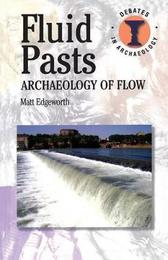
|
Fluid Pasts: Archaeology of Flow
Paperback / softback
Main Details
| Title |
Fluid Pasts: Archaeology of Flow
|
| Authors and Contributors |
By (author) Matthew Edgeworth
|
| Series | Debates in Archaeology |
|---|
| Physical Properties |
| Format:Paperback / softback | | Pages:160 | | Dimensions(mm): Height 216,Width 135 |
|
| ISBN/Barcode |
9780715639825
|
| Classifications | Dewey:930.1 |
|---|
| Audience | | Postgraduate, Research & Scholarly | |
|---|
|
Publishing Details |
| Publisher |
Bloomsbury Publishing PLC
|
| Imprint |
Bristol Classical Press
|
| Publication Date |
22 September 2011 |
| Publication Country |
United Kingdom
|
Description
Fluid Pasts outlines an innovative archaeological approach to the study of rivers and flowing water, challenging the view that rivers are somehow more natural, less cultural than other kinds of material evidence. In bringing archaeological perspectives to flowing water, as opposed to static and solid objects, the book follows water from rivers along numerous channels to the many archaeological sites where running water was utilised or built into designs and layouts, or where other kinds of flow have left material traces. A focus on flow changes our perception of otherwise ordinary sites and landscapes, its very nature prompting us to think about the material world differently, and to develop more dynamic and fluid forms of analysis.
Author Biography
Matthew Edgeworth is Research Associate and Project Officer, School of Archaeology and Ancient History, University of Leicester.
ReviewsBeyond dams and diversions, the author extends the cultural dimension of watercourses to take in their more ethereal property of 'flow' ... a thought-provoking thesis on a very wide-ranging subject, which deserves much greater consideration. -- Stuart Nisbet, University of Glasgow ...this is an ambitious book with a big argument.[...]Commendably, Edgeworth uses the theoretical literature and theoretical perspectives critically yet effectively, i.e., actor-network theory, symmetrical archaeology, phenomenology, etc., both to think through the case studies and to support his broader argument about the utility of the concept of flow. -- Cecelia Feldman Weiss, University of Massachusetts Amherst * The New England Classical Journal *
|